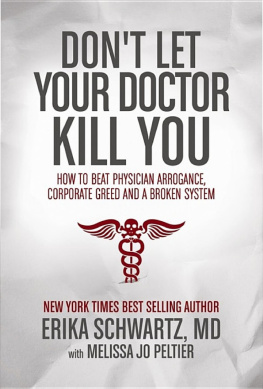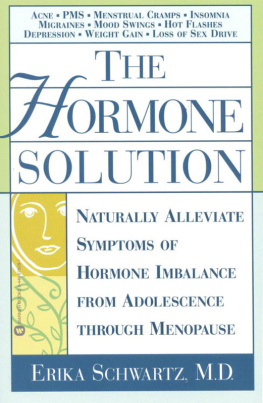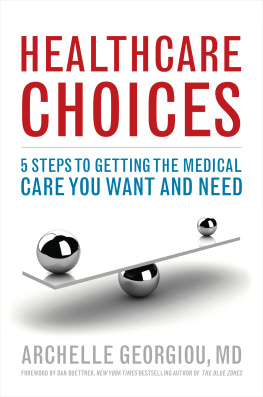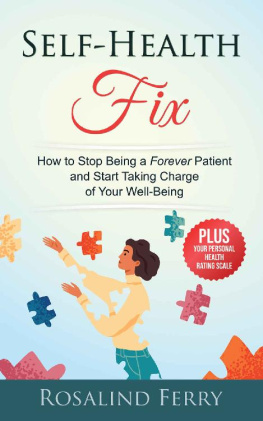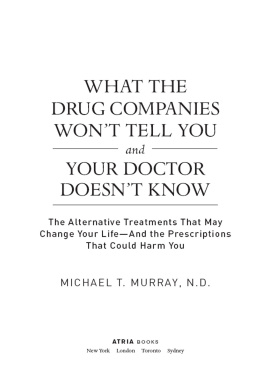DONT LET YOUR DOCTOR
KILL YOU
HOW TO BEAT PHYSICIAN ARROGANCE, CORPORATE GREED AND A BROKEN
SYSTEM
ERIKA SCHWARTZ, MD
with MELISSA JO PELTIER

A POST HILL PRESS BOOK
ISBN (hardcover): 978-1-61868-862-0
ISBN (eBook): 978-1-61868-863-7
Published at Smashwords
DONT LET YOUR DOCTOR KILL YOU
How to Beat Physician Arrogance, Corporate Greed and a Broken System
2015 by Erika Schwartz
All Rights Reserved
Cover Design by Spiro Designs
No part of this book may be reproduced, stored in a retrieval system, or transmitted by any means without the written permission of the author and publisher.
Post Hill Press
275 Madison Avenue, 14th Floor
New York, NY 10016
http://posthillpress.com
DISCLAIMER
The information and advice herein is not intended to replace the services of trained health professionals or be a substitute for individual medical advice. You are advised to consult your health professional with regard to matters related to your health, and in particular regarding matters that may require diagnosis or medical attention.
Contents
Introduction
Prologue: The Perfect Patient
Chapter 1: The Price of Arrogance Chapter 2: The Culture of Disease
Chapter 3: Welcome to the Medical Industrial Complex Chapter 4: One Pill to Save Us All - Part I Chapter 5: One Pill to Save Us All - Part II Chapter 6: Hospitals Will Make You Sick Chapter 7: Solutions: Your Turn to Carry the Ball Glossary
Recommendations for Further Reading Helpful Organizations
References and End Notes
About the Authors
To all the caring doctors who commit their lives to helping people improve their health, these doctors must become the norm.
To all the patients who want to partner with their doctors, this book is a manifesto to empower you to seek and receive the best medical care.
ERIKA SCHWARTZ, MD WISHES TO THANK:
...the caring and humble doctors who have inspired me and to my patients who trust me.To my husband Ken Chandler, Anthony Ziccardi and Howard Mann who provided me the support and encouragement to get this book published. To Gene Calderon, my posse of puppies, and my friends Wendy, Velleda, Rhonda, and Carol you keep me grounded and remind me what matters in a world where its often too easy to forget.
To Melissa Peltier and Victoria Reggio, thank you for your passion, commitment, and support. Your input in the making of this book is invaluable.
To my daughters Lisa and Katie and their growing brood of children who deserve excellent and kind healthcare.
MELISSA JO PELTIER WISHES TO T HANK:
the many truly caring doctors Ive known throughout my life, whove gone above and beyond for me and my family (and some of whom are actually in my family!). As always, I thank my husband, John Gray, who always inspires me to be the best I can be.
Above all, I thank Dr. Erika Schwartz, who is what every doctor should bea beautiful, passionate, caring human being.
Introduction
Do you have as much faith in your physician as you did twenty years ago? Do you respect him or her as much as your parents or grandparents respected their doctors? If you have to go into the hospital, do you fear you will come out sicker than when you went in? Is your medicine cabinet full of prescription bottles? Do you spend your days going from one medical test to another? Is the fear of being diagnosed with a deadly disease dominating your life? Does the never-ending stream of conflicting scientific studies that come out almost daily make you wonder if there is anything or anyone in medicine you can trust?
If you answered yes to any of these questions, you are part of a loud yet totally ignored majority.
More and more people are finding that the medical establishment has gone from Health Care to Health Scare, and they want to know how to protect themselves. Many have tried to tame the unruly beast our healthcare system has become, yet nothing seems to improve the mess. I am just one doctor who has been pondering these problems and found sustainable solutions that are working in the world my patients and I have inhabited for decades. That is why I wrote this book.
In 1998, before my first book Natural Energy was published by Putnam, I had written an outline for a book called Dont Let Your Doctor Kill You. It was my attempt to raise public awareness of the runaway train our healthcare system was becoming. As I saw it then, medical care was shifting to a focus on disease, and the rapid rise in subspecialties and technological modalities was encouraging this shift. From my perspective it was clear that in order to see real progress we needed to develop an integrated, preventive care medicine model.
The plummeting quality of care I saw was a direct consequence of the trend toward depersonalization and over-specialization that was taking hold of conventional medicine in late twentieth century America. It was crystal clear to me that, with the decline in a solid doctor-patient relationship, things were only going to get worse. I predicted that the system would spin out of control and, tragically, I was right.
My most important insight was that, unless patients took responsibility for their own outcomes, we were heading for a major healthcare crisis.To be able to effectively take responsibility, they needed a physician as a partner, not a patriarchal automatonthe model of doctor medical schools were continuously churning out. I could say this because I was trained to be one of those doctors.
I am a conventionally trained and practicing internist subspecializing in critical care, with five years experience as Medical Director of a tertiary academic trauma center north of New York City. Following that, I spent almost two decades in private practice in internal medicine, a branch of medicine that deals with the diagnosis and treatment of diseases that do not require surgery. My patients were a mix of blue collar, educated middle and upper middle classa representative slice of the American population at large.
Unequivocally, acute care is an essential part of the healthcare system. When trauma happensbroken bones, heart attacks, strokes
acute care does save people who would otherwise statistically have no chance of survival. But once the life is saved, then what? Once you no longer needed acute care, there was no focus on preventive follow-up.
The only thing we were trained to do was to find something else wrong and eventually get the patient back into the hospital, back into acute care. Oddly, the goal is to give you medications, tests, biopsies, and procedures, keeping you sick and terrified of missing an illness.
The way I saw it, the demise of primary care and the rise in subspecialties were trends that created even more confusion. I foresaw the new focus on technological advances and the rise in specialization breaking down of people into individual body partsas a surefire path to at worst life-threatening mistakes, and at best disjointed care.
I saw communication skills among doctors and between doctors and patients deteriorating in the hospitals in which I worked.
Priorities slowly shifted from how the patient was doing with the treatments ordered by a growing parade of subspecialists to how accurately and legally bulletproof the medical record was kept.
Departments of quality assurance and compliance grew exponentially in hospitals, while patient advocacy dropped to the bottom of priorities.
I watched doctors stop communicating with their patients. They just wrote their notes and orders, and rarely read what other doctors on the same case did. In the intensive care units there were systems with one physician supervising the entire care of the individual patient. But that was not where most hospitalized patients got their care and, as a result of the lack of coordinating physicians in general medical wards, patient care suffered.
Next page
